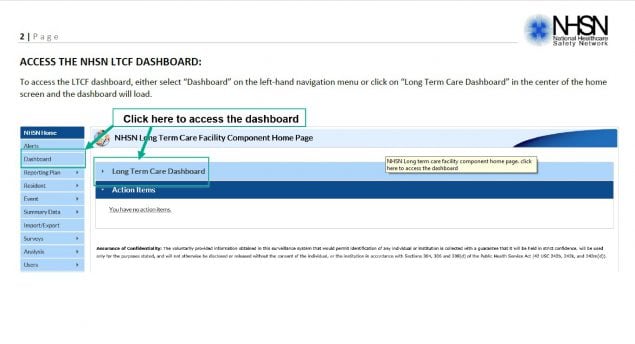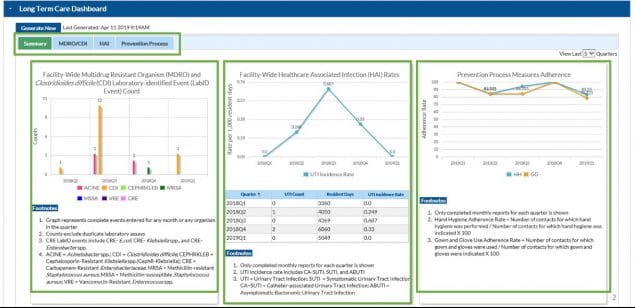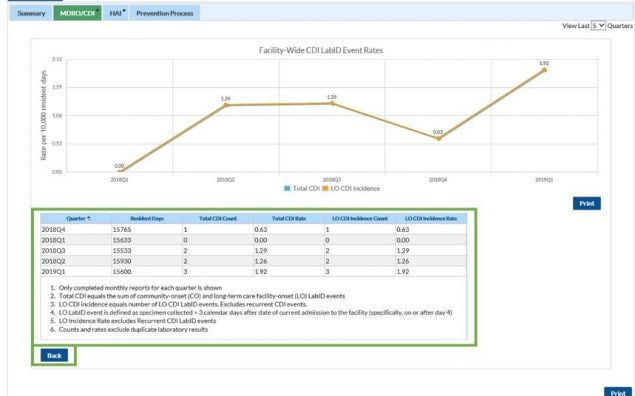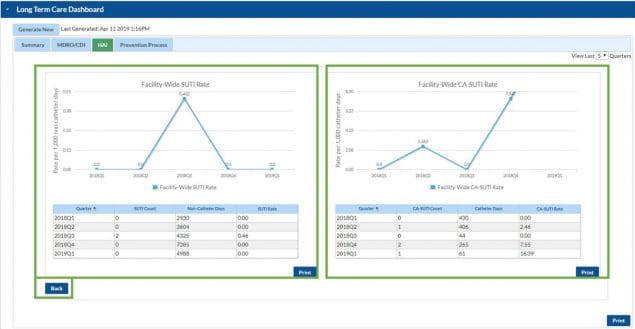September 2019 LTCF Newsletter
September 2019 Newsletter – Print version [PDF – 1 MB]
Recap: 2019 NHSN LTCF Component Training
The 2019 NHSN Long-term Care Facility Component Annual Training kicked off on a high note! Daniel Pollock, MD, NHSN Surveillance Branch Chief, welcomed participants by detailing the Centers for Disease Control and Prevention’s (CDC) history in surveillance and how the National Healthcare Safety Network (NHSN) was established. Jeneita Bell, MD, NHSN Long-term Care Lead, followed with a presentation on the national perspective of infection surveillance in LTC. During the two-and-half day session, other CDC experts shared information regarding infection prevention, reporting, and data analysis. Josephine Mak, MPH, Epidemiologist on the LTC team, unveiled the new interactive Long-term Care Facility Dashboard. In addition, staff from Secure Access Management Service (SAMS) and NHSN user-support were onsite to enroll new NHSN users and issue SAMS grid cards.
For those who attended, thank you for your help in making our 2019 NHSN Long-term Care Facility Component Annual Training a success! We recognize that your participation and commitment to improve resident health outcomes are critical to advancing our mission.
We value your continued support!
The LTCF Team
Facilitated NHSN Enrollment Opportunity For Long-term Care Facility Users
The NHSN Long-term Care team recently hosted its first annual facilitated NHSN enrollment guidance for long-term care facility users! The instruction included a four-part, interactive webinar series in June and July that guided new NHSN facilities and users through the 5-Step Enrollment for Long-term Care Facilities process.
Each session built upon the previous, and participants were given the opportunity to interact, and ask questions. In addition to the interactive webinars, participants were invited to join the annual LTCF training from July 9-11, 2019 in Atlanta, Georgia where they had the opportunity to meet with the NHSN user support and Secure Access Management Service (SAMS) teams to complete onsite identity verification, notarization of enrollment documents, and issuance of the SAMS grid card. A total of 14 participants were able to receive a SAMS grid card before the end of the LTCF training.
We appreciate the active participation and look forward to offering more opportunities to engage users in the future. Please let us know if you have ideas for additional support and learning opportunities you’d like for us to offer!
Thank you for your partnership and support!
NHSN LTCF Team
The LTCF Dashboard Is Now Available To Our NHSN Users!
The Long-term Care Dashboard was released in the NHSN application in July, 2019. This dashboard provides a quick overview of complete data reported into NHSN through the last 5 quarters. Users can access the dashboard by selecting the “Long Term Care Dashboard” tab on the home screen upon login. Then push the “Generate New” button in the upper left hand corner to view the most up-to-date data on the dashboard.

Summary View

MDRO/CDI View

HAI View

For more information on the dashboard and its functionalities, please see the Guidance Document for Accessing Dashboard [PDF – 1 MB], which can also be found on LTCF home page under the Analysis Resources tab for each Module.
Upcoming Webinars!
Identifying Barriers in Infection Prevention in Long-term Care Facilities
Dr. Morgan Katz, MD, MHS
Assistant Professor of Infectious Disease, The Johns Hopkins University, School of Medicine
Dr. Katz will be discussing ways to identify barriers in long-term care settings and presenting her recent research on implementing human factor approaches as a way to guide policy and infection prevention training in long-term care facilities.
Tuesday, September 17, 2019
1—2 PM, EST
Via ReadyTalk
Participant Dial-In Number: U.S. Toll: 303.248.0285
Access Code: 6393927
Registration Link: https://cc.readytalk.com/r/c2xy0d0uxe6p&eom
NHSN Long-term Care Facility Dashboard Overview
Josephine Mak, MPH
A 30 minute webinar for an overview of the new interactive Long Term Care Dashboard. This session will include a live demonstration of the features and capabilities of the dashboard as well as provide tips on how to best navigate the different reports that can be created.
Monday, September 23, 2019
1— 1:30 PM, EST
Via ReadyTalk
Participant Dial-In Number: U.S. Toll: 303.248.0285
Access Code: 6393927
Registration Link: https://cc.readytalk.com/r/2thrzliva7da&eom
Recent Publications
Save the Date: Decennial 2020 6th International Conference On Healthcare Associated Infections, March 26-30, Atlanta, GA
Held once every ten years, the Decennial Conference, co-hosted by the Society for Healthcare Epidemiology of America (SHEA) and the Centers for Disease Control and Prevention (CDC), reviews the advances of the previous decade and the opportunities and trends for the fields of healthcare epidemiology, infectious diseases, and infection prevention and control for the future.
Decennial 2020 – Thematic Series
Ten years ago, the healthcare field was issued a call to action for the elimination of healthcare-associated infections (HAIs) and to do more to protect patients from preventable harm. In the decade following, the field has made great progress toward that goal, and has made significant strides in combating antibiotic resistance (AR) on a global scale. As a result, healthcare is safer today.
In this Sixth Decennial International Conference on Healthcare Associated Infections program, three narrative themes will be highlighted to encapsulate many of the imperatives for driving this progress forward. As such, these themes are integrated throughout the program to collectively demonstrate progress and highlight future directions that may advance efforts to prevent infections, combat AR, and provide safe healthcare at every encounter.
Innovation – The development of novel prevention tools, strategies, diagnostics, and therapeutics has been critical in the progress of infection prevention and addressing the threat of AR. Further innovation related to healthcare technology, practices, policies, and programs are needed to continue to move towards the goal of eliminating HAIs and slowing antibiotic resistance.
Data for Action – Facilities, states, clinicians, and other stakeholders need data to drive detection and prevention strategies to eliminate HAIs and combat AR. Improvements in use of surveillance, epidemiologic, clinical, and laboratory data are critical to help close knowledge gaps and allow for the implementation of effective strategies to provide safe care.
Addressing AMR Without Borders – Many factors impact the local and global burden and transmission of AR. To prevent resistant pathogens from spreading within and between healthcare facilities and the environment, constant vigilance and action are needed. The spread of antibiotic resistance does not respect borders. The AR experience of any given facility, region, or country is directly influenced by the sharing of colonized or infected patients with its neighboring facilities, regions and countries. Global success in containing spread of HAIs and AR will require coordinated responses at the local, regional, and international levels. Public health and healthcare systems must work together to share information to detect and to implement effective practices to prevent infections from occurring and spreading.